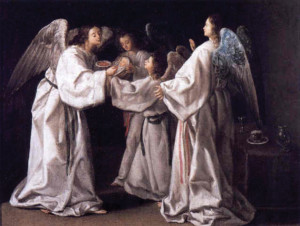Homily of Cardinal Jorge Mario Bergoglio, Archbishop of Buenos Aires, at the Mass in honor of the Patron Saint of Pregnant Women, San Ramon Nonato (St. Ramon, the Unborn) (August 31, 2005)

St. Raymong Nonnatus Being Fed by Angels, by Eugenio Caxés, 1630.
When you listen to what Jesus says: “I am sending you out like sheep among wolves” (Matthew 10:16-20), we want to ask: “Lord, are you joking, or you have no other, better place to send us?” Because what Jesus says is a little spine-chilling, “If you proclaim my message they will persecute you; they will entrap you to deliver you to the courts, to kill you. But you are going forward, so beware.” Jesus tells us “be wise as serpents and as innocent as doves,” both together…
What does Christian cunning consist of? In distinguishing between who is a wolf and who is a sheep. And when, in this carnival of life, a wolf disguises himself as a sheep, we also know how to sniff him out. “Look, you are wearing a sheepskin but you smell like a wolf.” And this mission which Jesus gives us is for something very important; it is for something very big. Jesus tells us something that gets our attention when someone asks him, “Well, why did you come into the world?” He replies: “Look, I came that you might have life and have it abundantly; I am sending you to carry that life forward, that it may be abundant.” Jesus did not come to bring death, especially the death of hatred, the death of fighting, the death of slander, which kills with the tongue. Jesus did not come to bring death. He suffered death in order to defend life. Jesus came to bring life, abundant life, and he sends us, bearing that life. But he says to us, “Be careful.” For there are some people who have what we hear about nowadays — the Culture of Death. It is not in the Gospel. It says that life only interests us if is good for something; if it has some useful purpose; and if not, it does not matter. And this weed of the Culture of Death has caught fire all over the world.
I was reading a book a while ago where there was this one shocking sentence: “In today’s world, the cheapest thing is life; what is the least costly is life.” Therefore, the most neglected, the most disposable. This old man and this old woman are useless; discarded. Hang them in the geriatric ward the way we hang an overcoat in the summer, with three mothballs in the pocket. Hang them in the nursing home because they are disposable, useless.
This little one who is on the way is annoying to the family. Oops! What for? I don’t know, let’s get rid of him — “return to sender.” That’s what the Culture of Death preaches to us. (…) It is not interested in life.
Today at the Shrine of Life, on this day of the Patron Saint of Life, Jesus again says to us: Be careful; I came to bring life and life in abundance, but watch out, you’ll be surrounded by wolves. You will be the ones to defend life, to care for life. To care for life! What a beautiful thing it is to see, for instance — a grandfather, a grandmother, who perhaps can no longer speak, who is paralyzed, and the son or grandson goes and grabs her hand and strokes it silently, nothing more. That is to care for life… and caring for life is costly. Yes, it is costly! It costs tears.
How beautiful it is to care for life, to let life grow, to give life like Jesus, and make it abundant, not allowing even one of the little ones to be lost. Jesus asked the Father, “that none of those you gave to me might perish; that all life that you gave to me to take care of be cared for, that it not be lost.” We take care of life because He cares for our lives from the womb. We have it in this year’s theme: “From the womb he was our protector.” He cares for us and teaches us.
We do not care for life because there is an ethical order to care for life; we simply care for life. Jesus teaches us to take care of life because it is in the image of God, who is all life.
We cannot preach anything but life, from the beginning to the end. We all ought to cherish life, to caress life, tenderness, warmth. That is what we are called to today and how beautiful it is! But it is a road that is full of wolves, and perhaps because of this they take us to court. Perhaps because of this they kill us for caring for life. Think of the Christian martyrs. They killed them for preaching the Gospel of life, this Gospel that Jesus brought.
But Jesus gives us strength. Forward!
When one talks about those things in the Culture of Life, to which we are called, one feels the pain that in so many hearts, even from childhood, the culture of death has been sown. The ego sows selfishness; “it’s good for me and I don’t care what happens to the other guy.” Who am I to care for the other guy? That phrase, remember who said it first? Cain. “Am I my brother’s keeper?” This is a criminal phrase, a deadly sentence. (…)
To care for life from beginning to end, what a simple thing, what a beautiful thing. Father, are there so many wolves that want to eat us because of this? Because of this.
Tell me, who did Jesus kill? No one. He did good works and how did it end? If we go down the road of life, ugly things can happen to us, but no matter, it is worth it. He opened the way first.
So, go ahead and do not be discouraged, care for life; it’s worth it! Amen. (translated by Marilyn Mallory)






Facebook Comments